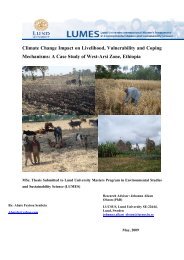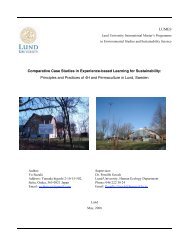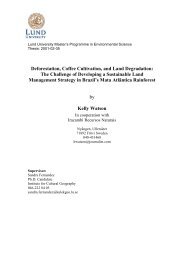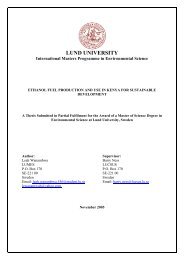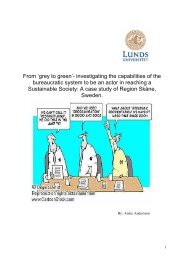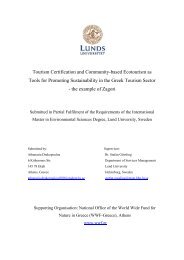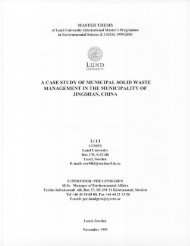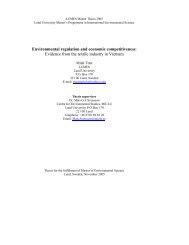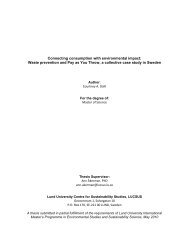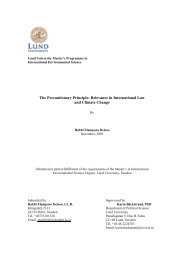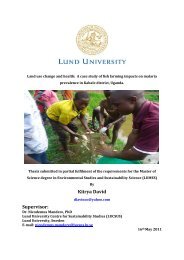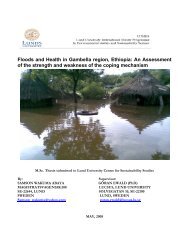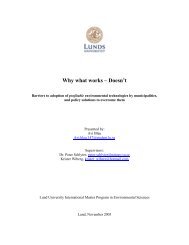2. Theoretical FrameworkThe theoretical starting point as a framework for critical understanding of thephenomena (Silvermann, 1999) for this study originates from the aim to identify theprinciples of sustainability that the GHGs emissions market mechanisms draw upon.The initial assumption employed for this purpose is that the climate change regimecan be best approximated by looking at it through the prism of the sustainabilitydiscourse, which represents a strong will of integrating economic, social, institutionaland environmental aspects of development (Dryzek, 1997). The study is based on theidea that it is possible to understand some common comprehension and underlyingvalue commitments within the discourse through studying how various actors at playinterpret it and what are the dominant narratives that manifested around the issue ofsustainable development on the ground.Since 1997 when Dryzek labeled sustainability ‘as a major game when itcomes to environmental affairs’, (Dryzek, 1997) it has become even a more broadlyaccepted way to frame issues related to the environment. Yet it can be also arguedthat sustainable development became an ideology for the 21 st century as a policydiscourse as well as development practice. Climate change regime is no exception.Definitions of sustainability and sustainable development abound. However,they tend to be abstract and thus open to diverging interpretations. Indeedsustainability nowadays is regarded as an overarching concept integrating multipledimensions and has been extended to indicate a dynamic process entailing associatedprogresses, among others, in the social, economic, institutional and environmentalspheres. Since the notion of sustainable development emerged in the 1980s as adesirable guiding principle for the world community, it has in many cases become a‘buzzword largely devoid of content’ as Esty notes (cited Elliot. 2004). The presentstudy acknowledges that the aims and meanings of the sustainable developmentconcept in the frame of climate change regime continue to be rather vague and broad.Regardless of all operationalized definitions of sustainability, there is still a room forconceptual division between the stronger and the weaker meaning of it.In this thesis, I will explore the conceptualization of sustainability by adoptingdiscourse analysis as a theoretical framework. As Phillips and Jorgensen (2002) vividdescription shows ‘discourse analysis is not to be used as a method of analysisdetached from its theoretical and methodological foundation, it is not just a methodfor data analysis, but a theoretical and methodological whole.’ Thus, I shall turn nextto explain how it is understood in the context of the current study. In line withDryzek’s (1997) interpretation I understand discourses as ‘a shared way ofapprehending the world’, ‘embedded in language’, and ‘specific ensembles of ideas,concepts and categorization that are produced, reproduced and transformed in aparticular set of practices’ as defined by Hajer (cited Bäckstrand and Lövbrand,2006).11
Sustainability discourse is formed by a number of concurrent and interactingdiscourses. There are overlaps and value conflicts, as well as struggle over meaning ofphenomena (Bäckstrand and Lövbrand, 2006). While recognizing the varietydiscourses that encompass and form sustainability discourse, for the purpose of thisstudy, drawing on Dryzek (1997) and Bäckstrand and Lövbrand (2006), I will focuson those sustainability streams that I have judged to be more influential in the climatediscourse: sustainable development and ecological modernization discourses.Sustainable development is ‘an integrating discourse’ (Dryzek 1997, p. 121)that seeks to ‘combine ecological protection, economic growth, social justice, andintergenerational equality, not just locally and immediately, but globally and inperpetuity’ (Dryzek 1997, p. 121). Sustainable development, as highlighted byDryzek (1997, p. 129) stresses ‘nested systems, ranging from the local to global’,thus, seeking to incorporate system perspective to embody integration across leveland context. This means in particular that discourse views cooperation andpartnership as the opportune approaches to environmental problems, rather thancompetition, and emphasizes citizen participation, personal development and wellbeing,including education and growing awareness, and, last but not least, economicalgrowth (Dryzek, 1997, p. 125).Ecological modernization discourse calls for changing political institutions aswell, however, unlike sustainable development discourse, it only promotesdiminishing the role of the state, instead of stressing the role of partnership betweenvarious institutions. However, at the same time the dominant feature of the ecologicalmodernization discourse is reliance on active cooperation between business and otherstakeholders. Thus, as Hajer (1995, p. 31) argues, it ‘uses the language of businessand conceptualizes environmental pollution as a matter of inefficiency, whileoperating within the boundaries of cost-effectiveness and administrative efficiency’. Itis focused on technological improvements (like, for instance, energy efficiency,renewable energy or material efficiency). Ecological modernization discourse aims toacquire economic and environmental benefits through improvements in technologicaland economic systems. This means, as noted by Hajer (1996, p. 248), that ‘economicgrowth and the resolution of ecological problems can be reconciled’. Moreover,ecologically modern discourse is more instrumental than sustainable developmentdiscourse and as Dryzek (1997, p. 143) argues it ‘has a much sharper focus than doessustainable development on exactly what needs to be done with the capitalist politicaleconomy’.Nevertheless, ecological modernization discourse as a perspective onsustainability is not a homogeneous view. It is a diverse discourse that represents acontinuum of strategies between weak and strong ecological modernization(Bäckstrand & Lövbrand, 2006). Basically, the fundamental difference betweenstrategies is a technocratic and neo-liberal view that doesn’t require any fundamentalchange in current institutions adopted for the weak approach, while strong ecologicalmodernization advocates for greater institutional reflexivity, democratization ofenvironmental policy and a stronger emphasis on the justice dimensions ofenvironmental challenges (Bäckstrand & Lövbrand, 2006). The distinctive features of‘weak ecological modernization’ and ‘strong’ version are summarized in the Table 1.12
- Page 5 and 6: LIST OF ABBREVIATIONSAFOLU Agricult
- Page 7 and 8: 7. WORK CITED 428. APPENDICES 49ANN
- Page 9 and 10: main driver for project development
- Page 11 and 12: 1.2. ANALYTICAL FRAMEWORK1.2.1 RESE
- Page 13 and 14: Discourse analysis is sensitive to
- Page 15 and 16: The organizations involved in the v
- Page 17: 1.3.3 LIMITATIONS AND SYSTEM BOUNDA
- Page 21 and 22: 3. UNDERSTANDING CARBON FINANCE3.1
- Page 23 and 24: are permitted to release is defined
- Page 25 and 26: the same time as the downward trend
- Page 27 and 28: preferences. This aspect of VCM pro
- Page 29 and 30: 4. EMPIRICAL FINDINGSBefore I turn
- Page 31 and 32: size, was mentioned as major factor
- Page 33 and 34: community-based Microsolar Lighting
- Page 35 and 36: funds establishment to channel fund
- Page 37 and 38: approach’ 10 (PC, 2009b). This in
- Page 39 and 40: Five standards out of 11 applied we
- Page 41 and 42: sustainable development nor other b
- Page 43 and 44: mechanism, technological solutions
- Page 45 and 46: voluntary markets enable more direc
- Page 47 and 48: therefore, there I have little grou
- Page 49 and 50: 7. WORK CITEDADBG (African Developm
- Page 51 and 52: Ellis, J., Winklerb, H., Corfee-Mor
- Page 53 and 54: Olsen, K., H. (2007). The Clean Dev
- Page 55 and 56: Wodak, R. & Meyer. M. (2001). Metho
- Page 57 and 58: ANNEX II. LIST OF ORGANIZATIONS IDE
- Page 59 and 60: ANNEX V. PROJECTS INVENTORY DATABAS
- Page 61 and 62: 333435QuirimbasCarbonLivelihoodsPro
- Page 63 and 64: 60616263646566Reforestationin Kibal



